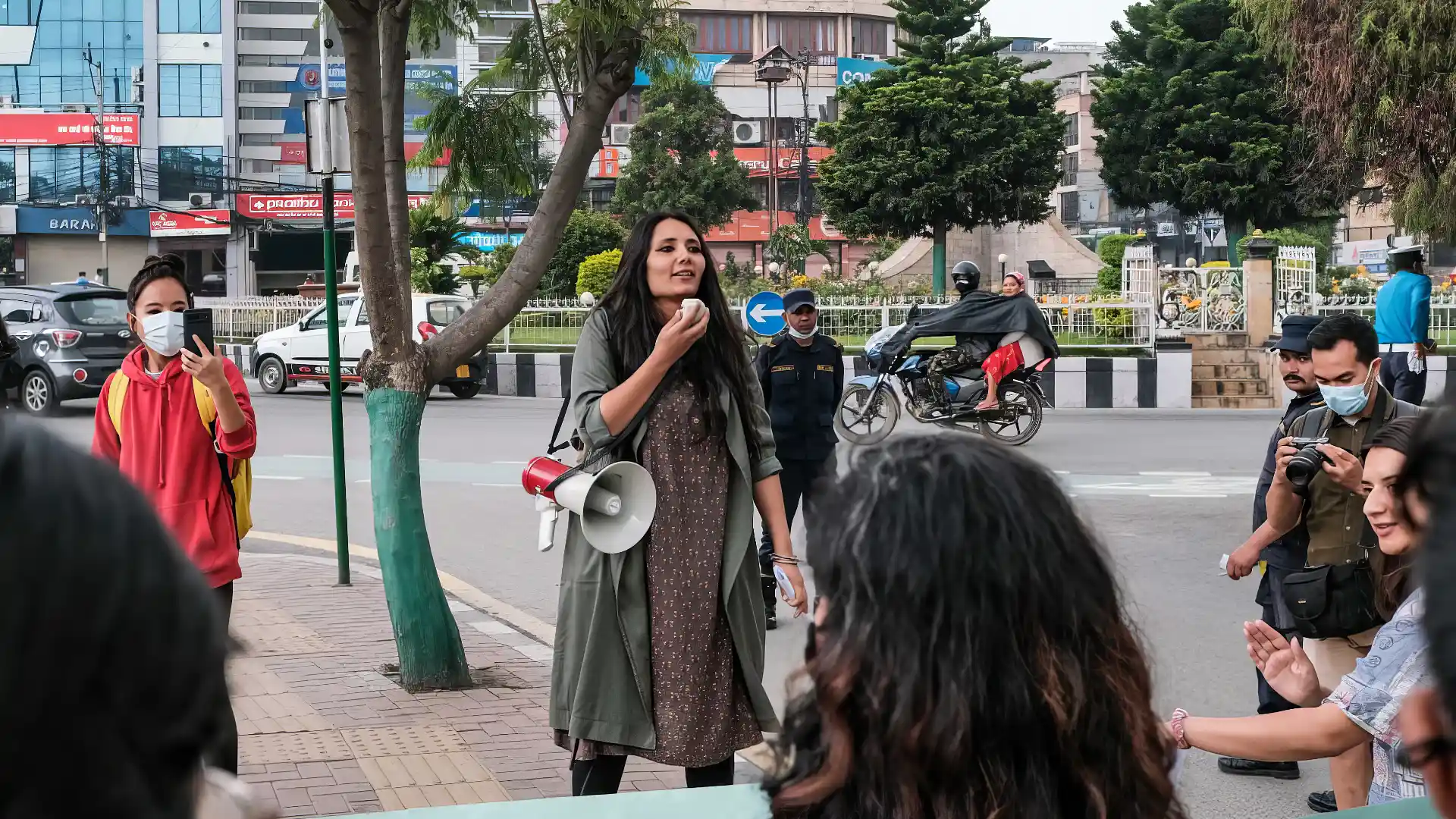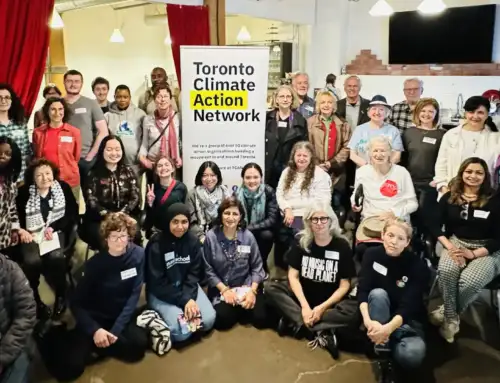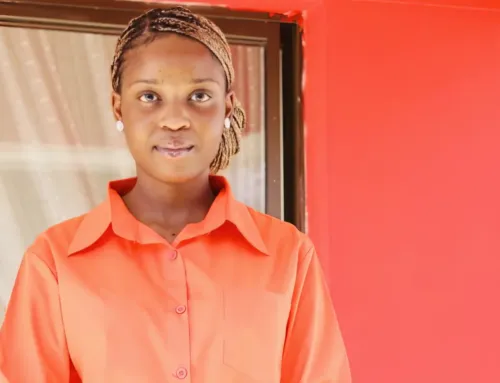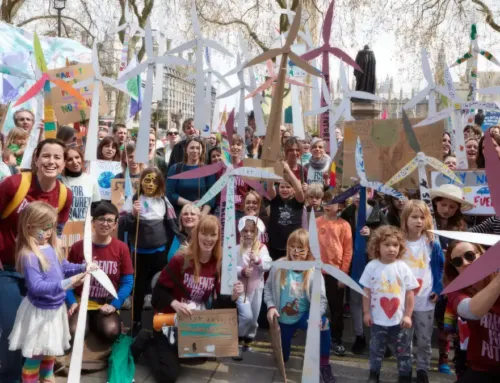STORIES
Shristi Singh Bhandari:
Protecting nature and the next generation in Nepal
Shristi Singh Bhandari is an environmental and animal rights activist from Kathmandu, Nepal committed to finding solutions that will help protect our natural environment for future generations. Shristi says that working with animals and becoming a vegan shaped her understanding of climate change issues. She campaigns to protect the natural environment, and working in collaboration with others, she has created urban pocket forests to tackle air pollution and water shortages. She also uses theater and storytelling to pass on conversation messages to the next generation. She received a Fellowship from Our Kids’ Climate in 2024.

When people think of Nepal, they think of blue skies and lofty mountain tops but the reality is that Nepal is grappling with air pollution, water shortages and deforestation on a large scale. In addition we have issues ranging from the endangerment of wildlife to a whole host of social challenges like lack of access to health and education in very remote areas. I started working on environment issues in 2005 but soon after I had my daughter, Tara, who is now 8, the issues around me started becoming magnified more than ever. I decided then to start advocating for a better planet for her and for all the animals who are also victims of the dire situation we’re in now.

In 2017, I co-founded the People’s Alliance for Nature, Nepal along with a small group of five women. We came together to stop the construction of an international airport in Nijgadh ( a small town in Nepal) which would entail the destruction of 8000 hectares of pristine forest. We filed a case. Four years later, in March 2022, for the first time in Nepal’s legal history, a full bench of five judges ruled on this matter in the Supreme Court. They found that the environment impact assessment report was not conducted properly and ruled against cutting even a single tree while seeking for an alternative site to build the airport. By this time, we had more than a 1000 people supporting and working with us!
Since late 2018, I’ve also been leading the Nepal Chapter of Women in Nature. We are an alliance of about 23 members from various backgrounds, who meet regularly online and in-person. Grandmothers, mothers, aunts – all of us work on issues of education, environment, health and safety.
From 2021 onwards, I have been volunteering as the executive director at the Jane Goodall Institute (JGI) of Nepal. Through the Roots and Shoots program of the JGI, I run a children’s conservation theater. Our first production was about vultures. A group of 24 children traveled with the play to nine locations in both rural and urban settings. We also set up environment clubs in the school we visit and begin projects on conservation, waste management etc. The JGIN is also working with children who write stories and will be publishing books for and by children soon. This inspired me to write my own book about wildlife and climate change issues based on the adventures of my daughter Tara, and my dog Maya. The book is written in Nepali and we hope to have it out by the end of this year.

Another very important aspect of my work takes place in my village – Aurahi municipality in Mahottari district in Madhesh Province, where I am renovating my ancestral home into a resource center for the local women and children. I’m already working with three local schools there and I am also starting a play school for about thirty kids between the ages of four to six, who haven’t started school yet. Along with literacy and math, we’ll be introducing them to the environment, wildlife, sanitation and personal health.
Many adult women there reached out saying they would like to learn too – most of them are illiterate and can’t even write their own names. They don’t know how to save money or how to open and operate a bank account. I’ve already formed a team of teachers and volunteers to help me out with this. But it’s not easy. We can’t just go in there and talk about the environment and climate change when there are so many complicated issues like child marriage and dowry that these women must contend with. All I ask in return is that they help with environment projects in their area – whether it’s afforestation or animal care, and to spread the message in their communities. So slowly through this program, I’m not only seeking to bring in social empowerment, but also climate change awareness and solutions.

I’m also very concerned about the worsening air quality in Nepal. Last year, Kathmandu was listed as the seventh most polluted city in the world. Our air has been dirty for a few years now. My daughter and her friends have puffy eyes, allergies, dry coughs – children are visibly affected by the polluted air. It breaks my heart to see my daughter suffering. One of the main reasons for our bad air is the diminishing tree cover within the city. So around June 2023, with the help of the division forest office, we planted 2 small pocket forests, with around 500 trees each, in Kathmandu. We chose areas where the local community would take charge in looking after them. For instance, one of the forests is within the premises of the Swayambhu temple, which is also a world heritage site. This year, we plan to create more such forests within and outside the city.
We can’t afford to sit still. Nepal is reeling from the effects of air pollution, water shortages, deforestation, vehicular pollution, construction – and we’re tackling all of it together. That’s the aim. Everything I do is based on the belief that this earth is borrowed from our future generations, and that’s why we need to protect it. My aim is to bring people closer to nature. Once we, as a society, start to feel the joy and positivity that being in nature brings, we’ll work harder towards preserving it.






